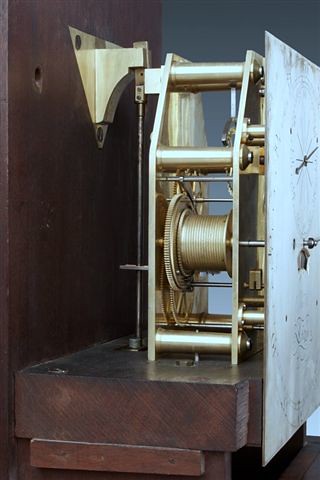Time ticking for rare regulator
Culture Minister Ed Vaizey has placed a temporary export bar on very rare early 19th Century regulator made in celebrated Arnold workshop.

Culture Minister Ed Vaizey has placed a temporary export bar on a very rare early 19th Century regulator made in the celebrated Arnold workshop. This will provide a last chance to raise the money to keep the timepiece in the United Kingdom.
The Minister’s ruling follows a recommendation by the Reviewing Committee on the Export of Works of Art and Objects of Cultural Interest, administered by the Museums, Libraries and Archives Council (MLA). The Committee recommended that the export decision be deferred on the grounds that the regulator is so closely connected with our history and national life that its departure would be a misfortune and that it is of outstanding significance for the study of horology in Great Britain.
 From as early as the 1660s to the introduction of quartz technology in the post World War II era, Britain led the world in the field of precision horology. During the 18th and 19th Centuries, London makers were at the forefront, pioneering new inventions and achieving ever more precise measurements of time.
From as early as the 1660s to the introduction of quartz technology in the post World War II era, Britain led the world in the field of precision horology. During the 18th and 19th Centuries, London makers were at the forefront, pioneering new inventions and achieving ever more precise measurements of time.
The Arnold workshop, founded by John Arnold (1736-1799) who passed it to his son John Roger Arnold (1769-1843), was in the vanguard of those manufacturing and supplying the finest and most precise machines during this period and their innovations are still found in many wrist watches of today.
Their regulators, used as a standard for regulating other timepieces or for timing astronomical observations, played a central role in the development of precision timekeeping, providing accurate timekeeping in relation to astronomy, navigation and surveying. Until now only eleven regulators by John Roger Arnold have been recorded.
The provenance of this particular regulator, made circa 1804, suggests that it may have been retained and used by the Arnold workshop, possibly employed as the workshop time-standard for testing the rates of marine timekeepers and other precision pieces before they were sold to the public or issued to navigators or the British Government.
Such examples in the field of horology are very rare, and examples of regulators from this period retaining all of their original components such as this one are even rarer, this being the only known of its type in the United Kingdom.
Lord Inglewood, Chairman of the Reviewing Committee, said: “This regulator was not intended to be an ornamental clock. It is a working tool in a very sophisticated clockmaker’s business, a business that itself was central to the position and progress of the United Kingdom at a very important moment in history.”
The decision on the export licence application for the regulator will be deferred for a period ending on 11 October 2010 inclusive. This period may be extended until 11 January 2011 inclusive if a serious intention to raise funds with a view to making an offer to purchase the regulator at the recommended price of £100,000 [excluding VAT (£107,000 including VAT)] is expressed.
Anyone interested in making an offer to purchase the regulator should contact the owner’s agent through:
The Secretary
The Reviewing Committee on the Export of Works of Art and Objects of Cultural Interest
Museums, Libraries and Archives Council
Grosvenor House
14 Bennetts Hill
Birmingham
B2 5RS
Telephone 0121 345 7428
Notes to Editors
-
For all media enquiries please contact Senior Media Relations Adviser, Sunita Sharma, on 020 7273 8299, email: sunita.sharma@mla.gov.uk
-
For enquiries on the operation of and casework arising from the work of the Reviewing Committee on the Export of Works of Art and Objects of Cultural Interest (RCEWA) please contact Sean BC Farran, RCEWA Secretary, on 0121 345 7428, email sean.farran@mla.gov.uk.
-
Photos of the regulator are available on the DCMS Flickr Photostream.
-
The Reviewing Committee on the Export of Works of Art and Objects of Cultural Interest is an independent body, serviced by MLA, which advises the Secretary of State for Culture, Media and Sport on whether a cultural object, intended for export, is of national importance under specified criteria. Where the Committee finds that an object meets one or more of the criteria, it will normally recommend that the decision on the export licence application should be deferred for a specified period. An offer may then be made from within the United Kingdom at or above the fair market price.
-
The details of the regulator are:A very rare and important early 19th-century mahogany month duration floor-standing regulator with dead beat escapement, maintaining power, 13 jewels and with original iron and zinc compensating pendulum. The square silvered dial signed, Arnold, London, and numbered 33. Height 193 cm.
-
Further details about the regulator including a listing of its provenance and literature can be found in the auction catalogue at the Bonhams website.
Please note: The description at the above link mentions a letter book. This is not part of or included in the considerations herein.
Press Enquiries: 020 7211 2210
Out of hours telephone pager no: 07699 751153
Public Enquiries: 020 7211 6000